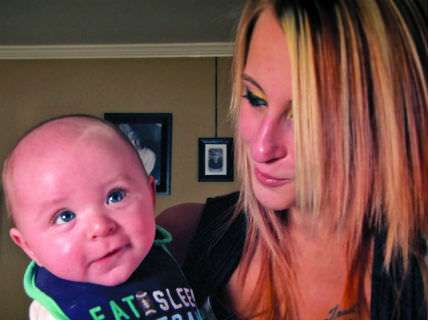Should Pregnant Addicts Go to Jail?
Criminalizing dependency is counterproductive and unconstitutional.

Darienne Dykes smiles as she thinks about her 5-month-old son, Phoenix. "He's everything to me," says the 21-year-old Nashville resident. "Being a mother is just the most amazing experience." Wiping tears from her eyes, she continues, "And now looking back, I definitely regret continuing using drugs during my pregnancy."
Dykes is not alone. Approximately 900 babies were born with Neonatal Abstinence Syndrome (NAS) in Tennessee last year, a 10-fold increase from a decade ago. NAS is caused when mothers continue their opiate use through pregnancy. Babies can usually be weaned off the drug within a few weeks after birth, and there are no known long-term effects.
Tennessee officials have declared NAS an "epidemic," however, and took action last July by implementating Public Chapter 820. This law allows the authorities to charge a woman with assault for using a narcotic while pregnant if her child is born harmed by the drug. An assault conviction is punishable by a fine and anywhere from one to 15 years in prison. So far, at least nine women have been charged.
The law has been controversial, with opponents saying it's counter-productive to put a drug-addicted mother in jail. Shelby County District Attorney Amy Weirich, a strong proponent of the law, says the point isn't to lock up these women. Instead, she considers the law a state-sponsored "motivation" to seek treatment.
"What we hope to do is to get these women help for their addiction," says Weirich, explaining that the women have the choice to go through drug court and complete rehabilitation instead of being processed through the regular criminal justice system. Once treatment is successfully completed, she says, the charges would be expunged from their record. But if the program is not completed, jail time is the consequence.
Thomas Castelli of Tennessee's American Civil Liberties Union points out that threatening mothers with the criminal justice system doesn't help when there's not enough drug treatment facilities to begin with. There are only 19 facilities in the entire state that offer rehabilitative care to pregnant women, and these are mostly centered in populated areas, leaving rural women with the burden of driving long distances to attend treatment. For many of these lower-income single mothers, this is logistically difficult.
This shortage in treatment facilities has resulted in waitlists ranging from a few weeks to a few months. Due to the new law, the waitlist can mean the difference between freedom and imprisonment for a pregnant woman.
Castelli argues that the law not only will prove to be counterproductive but is unconstitutional. "It violates the Eighth Amendment. The Supreme Court back [in 1962] determined that it would be cruel and unusual to punish people for having a status or having an illness," he says. The case, Robinson v. California, concluded that the state's law which criminalized being a drug addict was unconstitutional. Castelli argues that this law does the same thing.
The law has a sunset provision and is set to expire in two years, at which time lawmakers will review its efficacy and consider extending it. In the meantime, Dykes, who has been clean for nine months, plans to continue her successful drug rehabilitation for years to come.
"Just the joy he brings me from hearing the little giggle to seeing the little smile, there's nothing else that can beat that in life," says Dykes. "There's no drug that can give you that feeling."
This article originally appeared in print under the headline "Should Pregnant Addicts Go to Jail?."


Show Comments (27)